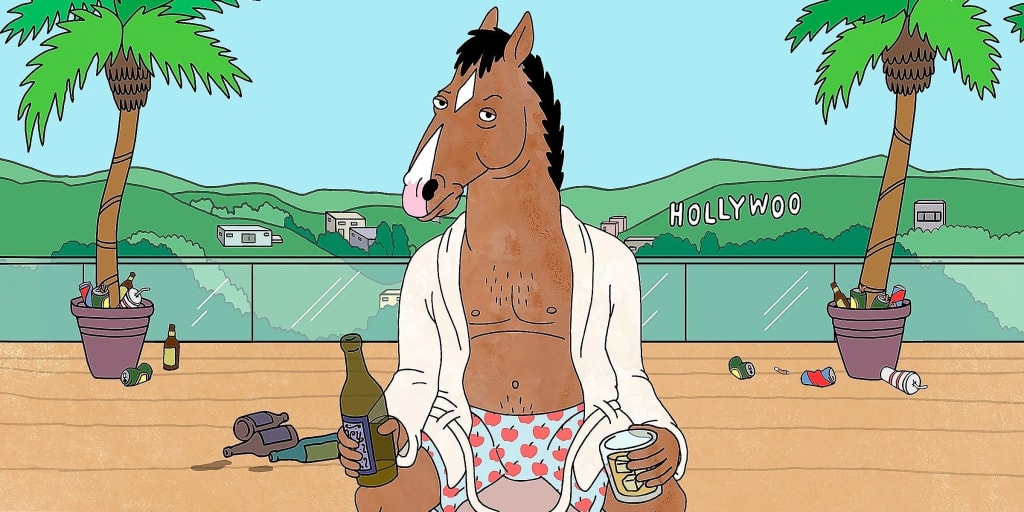
On the surface Bojack Horseman appears to be another TV show that romanticises abusive and destructive male figures, either normalising their actions or creating a redemption arc which lacks any form of accountability. For a long time this is the reason I put off watching it, it's a depressingly overused trope. However, that's not what the show is about.
With lots of time to kill, it was time to binge watch all 6 seasons back to back. A cartoon show that takes place in a (slightly off-putting) universe full of animals living beside humans seems like it would offer escapism. It doesn't. It picks apart the worst parts of life and all it's complexities.
It's not a redemption arc.
One of the main differences between Bojack Horseman and all the other shows featuring arrogant rich alcoholics is that there isn't a redemption arc. He doesn't change for 5 and a half seasons. He apologises constantly but, instead of being showered with forgiveness, everyone else just becomes irritated. Watching him continuing hurt people over and over, whilst still seeing himself as the victim is frustrating, but refreshingly realistic. From the start the show makes it obvious that this story is not about idealising problematic men, but about owning your mistakes. A trait that Bojack does not possess.
When he finally does turn over a new leaf, it gradually becomes clear he did not learn anything, or at least he did not become the 'good' character viewers are comfortable watching. I think the first time this is shown is in episode 12, season 6, in the interview with Biscuits Braxby which destroyed his reputation. For me the darkest part of the entire 6 seasons is when Braxby asks him about the imbalance in power dynamics between Bojack and the women in his life. Despite becoming a better person, helping others and staying out of trouble, it is clear he incapable of even understanding the question. He is no longer lying or carefully constructing politically correct sentences for appearances, he is panicking and spilling out his unfiltered thoughts. It's not as simple as being in denial, or refusing to acknowledge his mistakes, he completely lacks any understanding towards how he has treated people or what was so morally wrong about his actions.
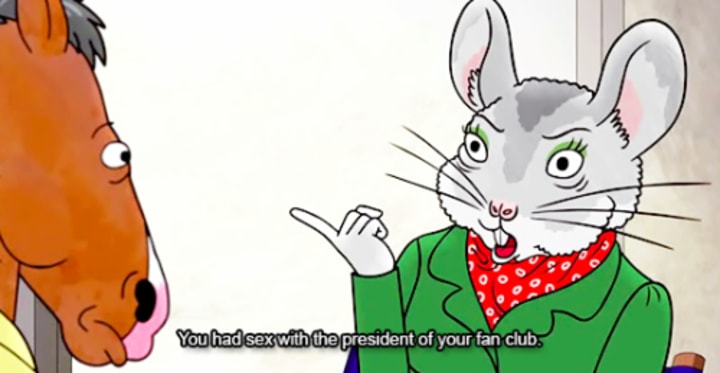
As a viewer you're left feeling like a disappointed parent. Did he really learn nothing? Can anyone really change?
This is soon followed by Bojack spending time with a character named Vance Waggoner. Hollywoo(b) is full of predators, enablers and generally not very nice people. Many of them are successful and face no consequences for their actions, but this one character is so violent, misogynistic and racist that even the most immoral people and animals don't want to go anywhere near him. So when Bojack quickly adopted Vance as his new best friend, when he had no one else, it took an even darker turn. Despite occasionally looking uneasy, Bojack enjoyed his company. He turns a blind eye to Vance acting sketchy with a young girl and accepts any attention thrown in his direction, regardless of what kind of person is giving it.

It is clear now how selfish he still is. It starts to feel a lot like Bojack does not pick his friends, but simply hangs out with anyone who will take him. Therefore, the people around him reflect what kind of person he is through-out the series.
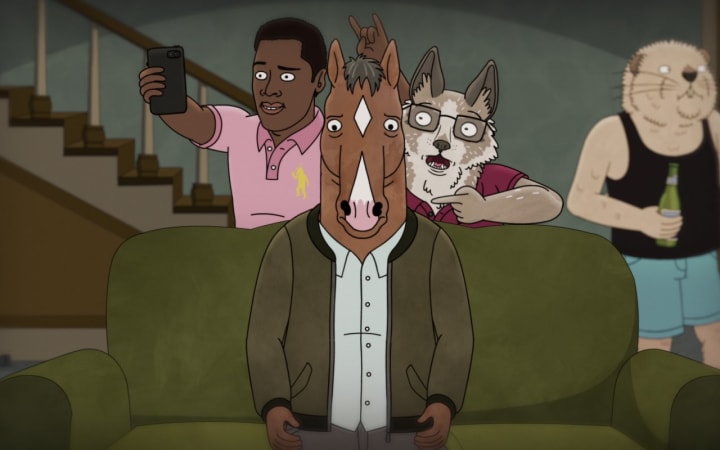
All the changes he has made to become a better person now feel like it was only to make himself feel better, help himself recover from depression and to escape from the harsh world of Hollywoo(b?). Whilst these are all healthy accomplishments, without taking the time to truly understand why his actions hurt other people his recovery becomes pointless and easily reversed. If Vance reflects who Bojack has become or what kind of behaviour he finds acceptable, then it can't be a redemption arc because not only has he failed to redeem himself, he has also possibly worsened.
During the interview with Braxby, we are made to look at his agent/manager, Princess Caroline. She looks visibly uncomfortable, as if realising for the first time that she might have been on the wrong side. The conversation continues after the interview, Bojack rants to Caroline about how the reporter only bought up women because it's 'hip at the moment', he asks her how they're going to recover from this and what their plan is. For once she doesn't indulge him, or save him, or stroke his ego. She tells him his life will be ruined in a few hours when the interview is released, so maybe he should think about how he wants to spend this time. Which highlights another key difference with this show; it's not about Bojack Horseman.
It's not about Bojack.
That might sound weird. I might be alone in feeling like this, but personally the show barely felt about Bojack Horseman. Whenever family walked in on me watching it and it was showing Princess Caroline adopting a baby, Todd discovering himself or Diane wrapped up in a ethical crisis, they would ask "Is this show even about the horse?"
The other characters stories felt like a lot more than just a side plot. And why they chose to stick by Bojack became a lot more important than why Bojack was a mess.
In the last episode, Bojack comes to Diane expecting to be therapised. But she refuses to do so. Instead she makes him listen to her. She talks about power imbalances. Diane has always been brave, smart and outspoken but there is a stark contrast between who she is now and who she was in the first season. It becomes clear how different Bojack's view of himself is to the way everyone else views him.
In the first few seasons, Bojack is constantly surrounded by young women he has power over. The self aware comments characters make about this could be seen as just lampshade hanging. However, in the last season these women have grown up and they're not sad, lonely, expired shells. They're thriving. Diane has put on weight from her antidepressants, she never wrote her meaningful memoir, she never had kids and she's an older woman. In any other TV show this would be a failure of a person, but here she's in her prime. She's fulfilled. The 'expiry date' on women is reinforced by media all the time. For the first time in my life, I didn't feel scared of growing older.
The show is a lot more diverse than you might think. It hides behind a few jokes about political correctness and Bojack's laddish persona, but the representation is well researched and accurate. It does not fall into the trap of over simplifying complex issues and insultingly sticking women and minorities into random places for no reason. There's no perfect people placed on pedestals. The characters are complicated and multi-faced, you're not made to take sides. It feels a lot more like the show is holding a mirror back at the audience than trying to teach a feel-good life lesson.
Amongst all this, Bojack's biggest purpose feels like a tool to make the show more accessible. A lot of people joined conversations they would have otherwise never taken part in, all because they wanted to watch a drunk cartoon horse being mean.
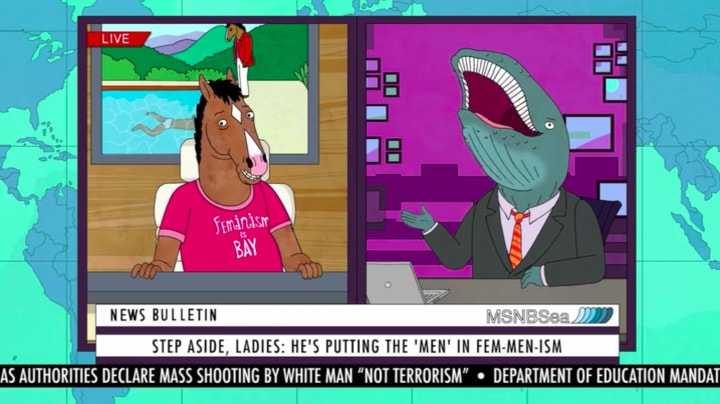
The wider demographic it has reached is the real genius. If you had advertised the show for what it was, a thorough look into feminism, inequality and asexuality, no one would have watched it and the writers probably would have received death threats.


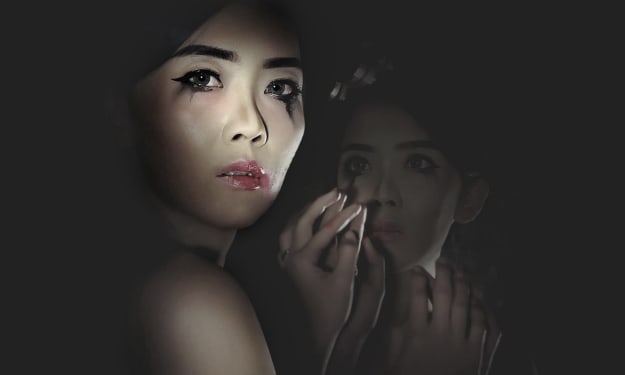

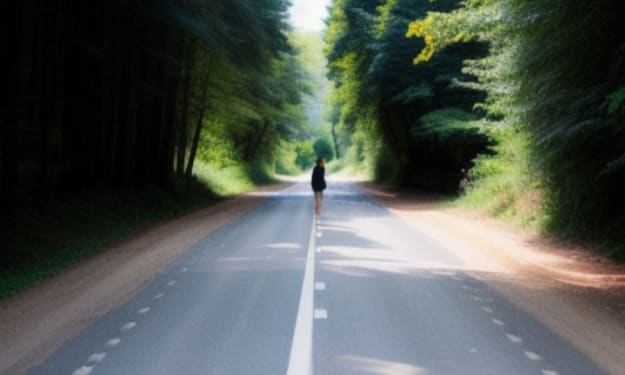
Comments
There are no comments for this story
Be the first to respond and start the conversation.